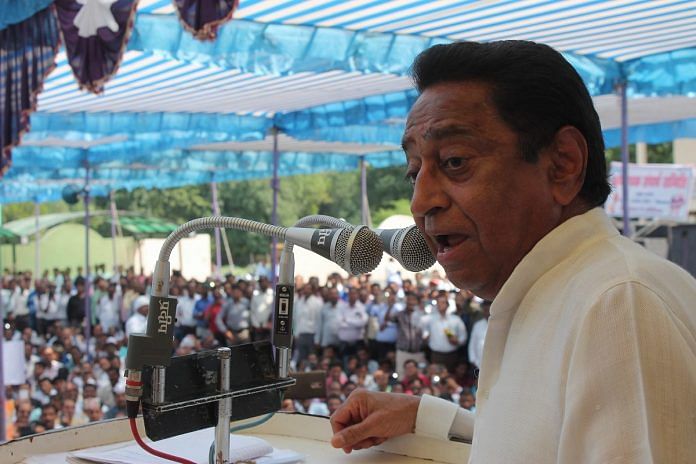The two national parties have played spoilsport for each other in many seats in the last three elections. But the Congress is now considering an alliance.
New Delhi: Congress veteran Kamal Nath has several obvious challenges in his new role as the president of the Madhya Pradesh unit of the party and at least one unlikely task – sewing up an alliance with Mayawati’s Bahujan Samaj Party and ensuring that it does not eat into Congress votes like in the past.
In the last six years, the BSP has lost much of its clout in its home state of Uttar Pradesh. It has no Lok Sabha MPs, and won just 19 seats in the 2017 assembly elections. But in neighbouring Madhya Pradesh, it has enough clout to affect the outcome in a number of seats – more to the detriment of the Congress.
In fact, the BSP has consistently eaten into the Congress vote share and ruined its chances of victory in a significant number of seats in the last three assembly elections. And the Congress seems to have recognised this and is considering a pre-poll alliance with the BSP, with Nath himself indicating this to ThePrint.
“We will talk to all like-minded parties, including the BSP, to defeat the BJP in the state,” Nath told ThePrint.
A clear third
The BSP, founded by Kanshi Ram in 1984, made its electoral debut in MP in 1990. Its vote percentage places it a clear third after the BJP and the Congress — after scoring 3.53 per cent of the vote in its first election, it has regularly hit the 6-8 per cent mark in all subsequent polls.
In the last three elections (2003, 2008 and 2013), while the BJP has been the comfortable winner over the Congress in the state, the BSP has won two, seven and four seats respectively.
But, interestingly, it has garnered enough votes to damage the Congress’s chances according to an analysis by ThePrint.
How the BSP cost the Congress, and vice-versa
In 2003, the Congress, which was battling anti-incumbency after two terms in power under Digvijaya Singh, managed to win just 38 of the state’s 230 seats. The BSP won two seats on its own. But equally worrying for the Congress was that it lost 25 seats because BSP candidates secured enough votes from the parties’ common vote bank. In 14 other seats, the BSP lost because of the same division of votes with the Congress.
Mathematically, if the Congress and the BSP had contested together, they would’ve won 79 seats in 2003. It wouldn’t be enough to topple the BJP, but it wouldn’t have been as one-sided as it turned out to be, with the BJP winning 173 seats.
In 2008, the Congress did better, winning 71 seats compared to the BJP’s 143. But again, the BSP cost it 39 seats. On the flip side, while the BSP won seven, it could’ve won 14 more had it not been for a division of votes with the Congress. Together, a Congress-BSP combine could have won 131 seats, good enough to form the government in the state.
In 2013, a few months before the Lok Sabha elections which saw the Narendra Modi wave sweeping the country, it came as no surprise that the Congress couldn’t defeat the BJP in Madhya Pradesh. Ten years of the UPA’s rule at the Centre and several corruption allegations had made the task difficult for Congress. The factionalism within the party added further to its woes.
The BJP won 165 seats despite the Vyapam scam coming to light and implicating party leaders a few months earlier. And once again, the BSP played spoiler for the Congress. The grand old party’s tally of 58 could have gone up by 34 seats without the division of votes, while the BSP could’ve won 11, up from its actual tally of four. Together, they could have won 103 seats, running the BJP close.
Attempts to forge an alliance
The BSP has always been stronger in certain pockets of Madhya Pradesh, especially the Chambal region and other areas bordering Uttar Pradesh. This is also because the highest concentration of Dalits in the state — around 15 per cent — is found in this region. In the 2013 election, the party registered a presence in 22 of the state’s 50 districts.
This time around, with Kamal Nath in charge of the Congress, a pre-poll alliance including the BSP is likelier than ever before, given his reputation for getting along with leaders of all parties.
Besides the BSP, the Congress is also willing to take the Gondwana Gantantra Party on board. The GGP has a say in tribal Madhya Pradesh, and has also damaged the Congress’s hopes in a few seats.
The current formula being discussed within the Congress is to give 15 seats to the BSP. This includes the four seats won by the BSP in 2013, and 11 seats where the party stood second.
“But this is not final; actual details would emerge only when we have discussed the matter with the BSP,” said a senior state Congress leader. “If by giving a few seats to BSP we can win 40-odd seats, there is no harm in fighting together.”
However, Ashok Siddharth, BSP Rajya Sabha MP from Uttar Pradesh, said there has been no official approach from the Congress. “As of now, no one from the Congress has approached us for an alliance. As guided by our leader Behen Mayawati ji, we are preparing to put up candidates in all seats in Madhya Pradesh,” he said.
But given what’s happening in Uttar Pradesh, where the BSP has decided to ally with its bitter rival of 25 years, the Samajwadi Party, to stop the division of votes and bring down the BJP, an alliance in MP can’t be ruled out.



